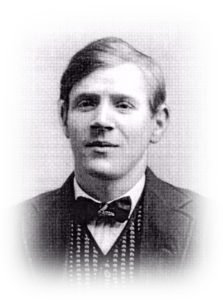Robert Dunsire VC lived for just over 24 years into which he packed experiences, achievements and recognition which very few will ever manage over an even longer lifetime. When opportunities came his way, Robert grasped them and tackled them with skill, purpose and determination to do his best and to set an example that others might follow. He was a shining light of his generation.
He tackled life with a positivity, calm assurance and humility that was always seemingly understated. This was reflected in his performances with his violin and cornet and his determination to succeed as a miner through further education. To get something out of life a person has to put something extra in. Robert’s personal skills were demonstrated throughout his short life and seemed to be magnified when he stepped forward to volunteer for the Royal Scots in January 1915 after the outbreak of World War 1. At that time, he made a very significant personal sacrifice to leave behind Kate, a young bride of less than 6 months, to enlist in Kitchener’s Army. His life as a hewer in the Pannie and Rosie Pits would certainly have physically toughened Robert but he also learned that teamwork and mutual responsibility were invaluable skills. His own religious experiences would have enhanced his own gentle humility and respect for others.
His decision to become a soldier took him to new and distant places in Great Britain and, ultimately, to France. For a miner from Fife this was a fresh challenge but he was with many colleagues who would also be facing that same challenge. From reports, Robert threw himself into this maelstrom and was fully engaged in becoming the best he could be. Consequently, he would be called upon to demonstrate trench making skills while he made an impression on officers who picked him out to become one of the few machine gunners in his Battalion.
Robert was to become a member of another specially selected group as a result of his bravery in the face of the enemy at the Battle of Loos on 26 September 1915. His Act of Valour at Hill 70 in rescuing men under heavy enemy fire resulted in his nomination for and award of the Victoria Cross some 2 months later.
The Victoria Cross is the premier Operational Gallantry award given for ‘most conspicuous bravery, or some daring or pre-eminent act of valour or self-sacrifice, or extreme devotion to duty in the presence of the enemy’.
In World War 1 Robert was the second Fife born recipient of the highest honour for action in face of the enemy. David Finlay VC was the first in May 1915 and Robert Dunsire VC was followed by John Erskine VC in June 1916, John McAulay VC in November 1917 and David Hunter VC in September 1918.
Robert was the second of six Royal Scots who were awarded the Victoria Cross in World War 1. A Lance Corporal of the Highland Light Infantry who was attached to 8th Royal Scots was also awarded the Victoria Cross.
The announcement of Robert’s Victoria Cross drew great praise and newspaper headlines. Robert carried the burden of ‘fame’ with ease and humility. He was still the Fife miner at home in Fife and nationwide he had been less than a year earlier. Sadly, he was never to return to his wife, Kate, and his job as a miner after being wounded in action, then dying on 30 January 1915.
Robert’s name did not stay long in the public eye after the end of World War 1. Family members quietly remembered him at home but no one attempted to capitalise on his achievements. It took time for his name to be recognised in the public domain when a new street in Overton, Kirkcaldy was eventually named after him in 1935. There are limited mentions of Robert Dunsire VC in the press after this except when his nephew, who was a Sergeant in the Royal Tank Regiment, was posted missing in mid-1942 and. on a second occasion, a second nephew who had served in Burma married in 1945.
The interest and pride of the family around the UK and internationally has always been maintained, but never exploited. Their participation and follow-up interest before and after the VC Commemoration Ceremonies in Buckhaven on 26 September 2015 have always been achieved with a quiet humility and dignity that was always accompanied by gratefulness for the telling of Robert’s story.
In meeting Robert’s family members over recent years, I can only observe that Robert’s 100 years-old character legacy has passed through the generations of Dunsires family members. I am sure he would be as equally proud of them as they are of him.
